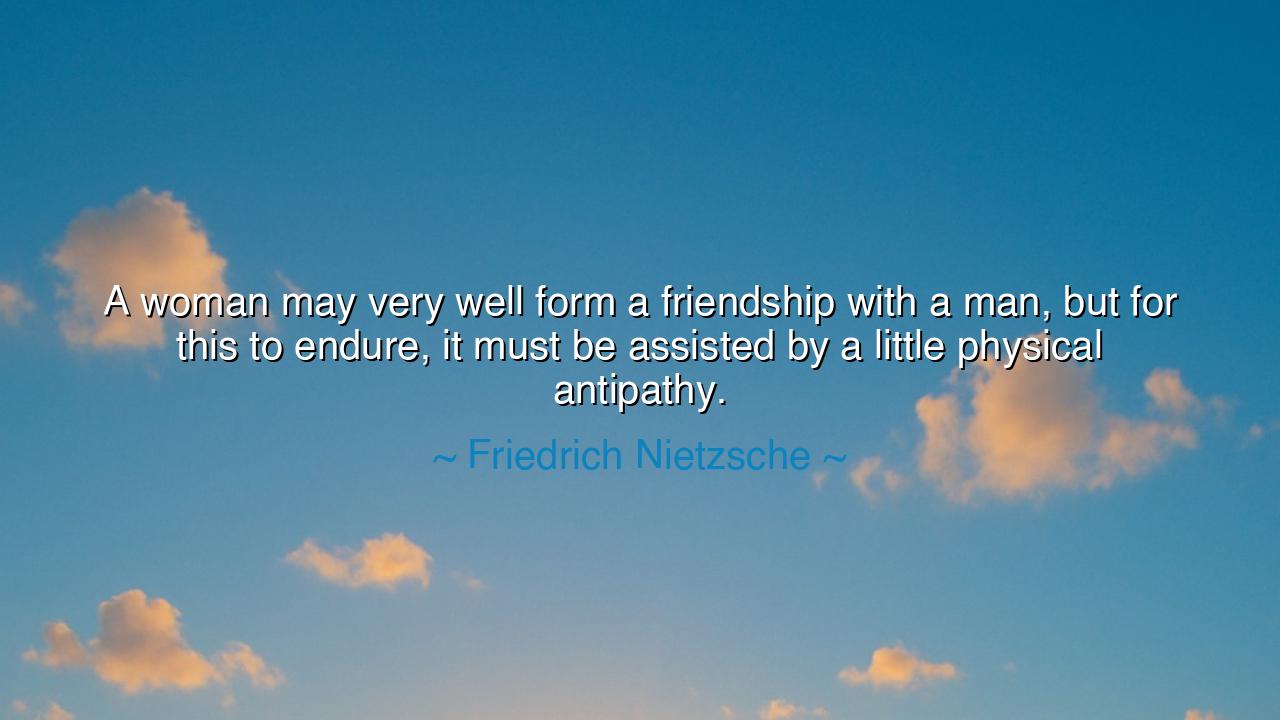
A woman may very well form a friendship with a man, but for this
A woman may very well form a friendship with a man, but for this to endure, it must be assisted by a little physical antipathy.






In the striking and paradoxical words of Friedrich Nietzsche, that philosopher of fire and depth, we hear a truth that is both unsettling and profound: “A woman may very well form a friendship with a man, but for this to endure, it must be assisted by a little physical antipathy.” Beneath the sharp edge of these words lies not cynicism, but insight — the recognition of the delicate tension that exists between friendship and desire, between the purity of the mind and the pull of the body. Nietzsche, ever the examiner of human motives, saw that the friendship between man and woman could be as noble as it was perilous. To last, it must rest not upon attraction, but upon mutual respect, and even upon a touch of resistance — that “little antipathy” which keeps admiration from slipping into longing, and companionship from falling into confusion.
Nietzsche lived in an age of boundaries, yet he thought beyond them. His words were not born from contempt for affection, but from his understanding of its power to consume clarity. Friendship, he believed, was the highest form of human relationship — one founded upon equality of spirit, honesty, and freedom from possession. But between man and woman, such equality was often endangered by the passions of the flesh. Thus, he warned, if friendship is to endure between the sexes, it must be fortified by temperance, by a certain coolness that preserves the harmony of the soul. The “antipathy” he speaks of is not hatred, but a natural guardrail — a small, respectful distance that allows two souls to see each other clearly, without the haze of physical desire.
To understand this, let us recall the story of Héloïse and Peter Abelard, the philosopher and his gifted pupil from twelfth-century France. Their bond began as one of intellect — teacher and student, joined in the pursuit of truth. But their friendship was consumed by passion, and that passion led to tragedy. Abelard was disgraced, Héloïse confined to a convent, and what might have been an enduring meeting of minds was forever scarred by the weight of love’s consequences. In later years, they found peace again through letters, their affection purified by distance and sorrow. Only when desire was conquered could their friendship return, tempered by what Nietzsche called that “little physical antipathy” — the wisdom born of restraint.
Nietzsche’s insight, then, is not an attack upon affection, but a call for balance. For between man and woman lies both attraction and danger, inspiration and temptation. Friendship that wishes to last must be built not upon fleeting pleasure, but upon enduring respect. It must be a relationship of minds and spirits, not of possessive hunger. When he speaks of “antipathy,” he means that true friendship requires space — the freedom for each to remain themselves, unclaimed by the other. It is this respectful distance, this gentle boundary, that allows friendship to thrive without being devoured by the passions that often masquerade as love.
The ancients understood this balance well. Plato, in his dialogues, spoke of Eros, the divine love that elevates the soul through beauty, and how it must be disciplined to rise above mere desire. To see beauty and not be enslaved by it — that, he said, was the mark of the philosopher and the friend of truth. Nietzsche’s thought echoes this old wisdom: that the noblest friendships between man and woman are those that transform the energy of attraction into intellectual and spiritual communion. For where desire ends






AAdministratorAdministrator
Welcome, honored guests. Please leave a comment, we will respond soon